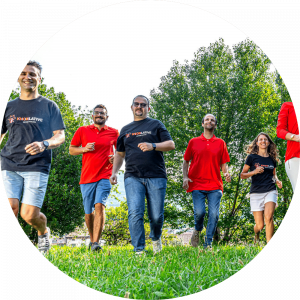The fact that we are scattered across modalities and geography and do not have a solid community is one of the key factors preventing Muscle Response Testing (MRT) from becoming mainstream. At Knowlative we believe that maintaining a common vocabulary is the key to reunite all modalities in the same tribe and be able to make our “kinesiology” (or whatever we are going to call it in the future) mainstream. Another key factor preventing us from spreading from 1 million people using Muscle Response Testing (MRT) in the world (actual estimate) to 10+ millions of solid professionals (a mere 0.13% of the World’s population): we are using a misleading (and, in some countries, illegal) term to describe what we do: ”Kinesiology”. As a group, we are not just studying human movement; often we do not address human movement at all. Here there is a selection of key concepts that explain how we think the game works. Follow the links to the Unit of Knowledge to read the definitions. This is the essence of what we do and how we think as professionals:
- Testing a Muscle is basically our biofeedback tool; we always test a muscle before doing something.
- Opposing Muscle Theory: When a muscle is tight and painful the key is often is to find the other muscles that are not working, causing a compensation pattern. We do not simply look at the muscle that is (over)working but examine the whole system in a holistic fashion.
- Live beings are filled with a kind of Energy we do not yet fully understood. Western medicine ignores it because we lack physics and double-blind controlled studies to explain it; but ancient Chinese medicine, Ayurvedic medicine and basically any form of traditional/ancient healing studies it. We use it to get incredible results.
- Triangle of Health: The relations within the body are quite complex but they follow a basic concept – stress within a specific structure or function can cause compensations in totally different systems in the body, for example, emotional stress can cause postural issues and pain and cause us to make poor nutrition choices. Our job is to help restore balance.
- Stress: every change creates stress in our bodies. Stress is the physiological response to change and, if we can resolve or cope with stress, we evolve. We help people resolve stress in a physiological way.
- Reflex: is an involuntary/automatic action that your body does in response to something. We use tons of reflexes to talk with the body and to help the person to regain Balance.
- Healing Crisis: most of the time, when “healing” symptoms appear it’s because we were not working within the Priority of the person – the body’s preferred order to resolve stress and perform corrections. Symptoms are not a physiological process. We can usually heal ourselves without a crisis!
- To do all these amazing things we use a Menu that is full of procedures (Procedure) and techniques (Technique).
This
is just an example of what Knowlative can do to enhance your work with Muscle Response Testing (MRT).
What you
see now is just one of the steps our team is trying to achieve. Our idea is to
progressively add:
- The possibility to book appointments and to safely record the client’s data inside Knowlative;
- This will allow us to link the Knowledge that you can see now to your data so to easily provide statistics for your work;
- Anonymised data will be gathered to publish observational studies on what Muscle Response Testing can achieve and to organize more significant studies in the future;
- An internal message system will allow us to interact even more and exchange our insights and experiences to make our science grow.
If you like the idea, support our work:
- Subscribing as PRO;
- Inviting your friends;
- Publishing in Knowlative your techniques and experience or updating existing units of knowledge with your knowledge.
If
you want to read more; use another highlighted group in the “Knowledge” page.
These groups are an easy way to access our huge database. You can create your
own groups in ‘MyKnowledge’ page and publish them so that you can help others.
If
you think of something important that seems to be missing, search for it in the
search bar in the home page. If you do not find it you can publish it in the "myKnowledge" page in the appropriate Unit of Knowledge category so that all other
users can grow with your insight. If any one of us shares something, we all
will be more effective with our clients and will be able to improve their lives
and ours. Collaboration
always wins.
Thanks for sharing!
Ludovico Feletto

